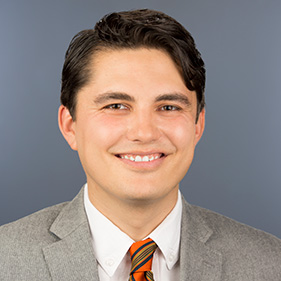COPD Clinic creates remote patient monitoring program to reduce hospital readmissions
UC Davis Medical center first hospital in region to treat high-risk patients remotely
Aiming to improve health outcomes and reduce hospital readmissions, the Comprehensive COPD Clinic at UC Davis Health has created the first remote patient monitoring program in the Sacramento region for high-risk patients with Chronic Obstructive Pulmonary Disease (COPD).
COPD describes a group of diseases that include emphysema and chronic bronchitis. Studies have shown COPD patients have a high rate of hospital readmissions. One study found that among Medicare beneficiaries admitted to the hospital for COPD, 19.6% were readmitted within 30 days.
“COPD is a disease that comes in many forms, so treatment needs to be tailored to individual patients and their burden of disease,” said Brooks Kuhn, assistant professor of medicine and co-director of the Comprehensive COPD Clinic. “The core mission of the program is to empower our high-risk patients with health technology tools to help remove barriers to care, emphasize preventive care, and improve self-management, which are critical to improving clinical outcomes and patient quality of life.”
The core mission of the program is to empower our high-risk patients with health technology tools to help remove barriers to care, emphasize preventive care, and improve self-management, which are critical to improving clinical outcomes and patient quality of life.” —Brooks Kuhn
Monitoring symptoms remotely with technology
The program enrolls up to 12 patients with COPD at any time, all of whom are given a pulse oximeter, an electronic device that measures the patient's heart rate and saturation of oxygen carried in their red blood cells. The data collected is uploaded to a dashboard on the patient's electronic health record and is monitored daily by respiratory therapists in the Reversible Obstructive Airway Disease program.
Additionally, patients answer one question everyday: “Are your symptoms better, worse or staying the same as yesterday?” This is also uploaded to their electronic health record.
“When we developed this program, we wanted to create something that integrated into our electronic health record program,” Kuhn explained. “We also wanted to make sure there was a strong robust clinical backbone behind it and the data we collected was actionable. Combining the data from the pulse oximeter with the patient's symptom data provided us some context.”
Within the dashboard, UC Davis Health’s information technology team members built a series of rules to filter the collected data. The team set up alarms that are triggered when a patient’s symptoms are concerning. Respiratory therapists then reach out to provide care and guidance.
“The goal for our respiratory therapists is to work with patients to identify early signs and symptoms of their COPD exacerbation to avoid unnecessary health care utilization,” explained Krystal Craddock, clinical operations manager for respiratory care. “Each patient has an action plan, and our respiratory therapists lead them through their personalized plan to control their symptoms and get them over that exacerbation hump to prevent the need for readmission to the hospital.”
According to the Centers for Disease Control and Prevention, 16 million Americans suffer from COPD. The CDC also stated that this number is likely higher as many have yet to receive a diagnosis or treatment.
“There are so many patients in our community that could benefit from a program like this and improve their clinical outcomes,” Kuhn added. “I appreciate the hard work of our amazing interdisciplinary team members, who have been crucial in getting the remote patient monitoring program operational. It allows us to personalize the care we provide our patients to their specific needs.”


